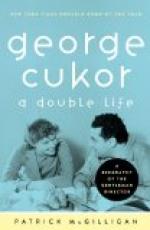|
This section contains 133 words (approx. 1 page at 300 words per page) |
An American film director whose career spanned over fifty years, Cukor was particularly adept at female-centered melodrama (Little Women, 1933; The Women, 1939), romantic comedy (The Philadelphia Story, 1940; Adam's Rib, 1949), and musicals (A Star Is Born, 1954; My Fair Lady, 1964, for which he received a Best Director Oscar). Often derided as a workman-like technician, revelations about Cukor's homosexuality led to reappraisals of his work by, in particular, queer academics, who focused on his predilection for more 'feminine' genres and gender-bending narratives, as seen in Sylvia Scarlett (1935), for example. Cukor has thus, like fellow director Dorothy Arzner, come to be perceived as an auteur, whose sexual identity influenced the final form taken by the Hollywood material he handled.
Further Reading:
McGilligan, Patrick. George Cukor: A Double Life. London, Faber and Faber, 1991.
|
This section contains 133 words (approx. 1 page at 300 words per page) |


